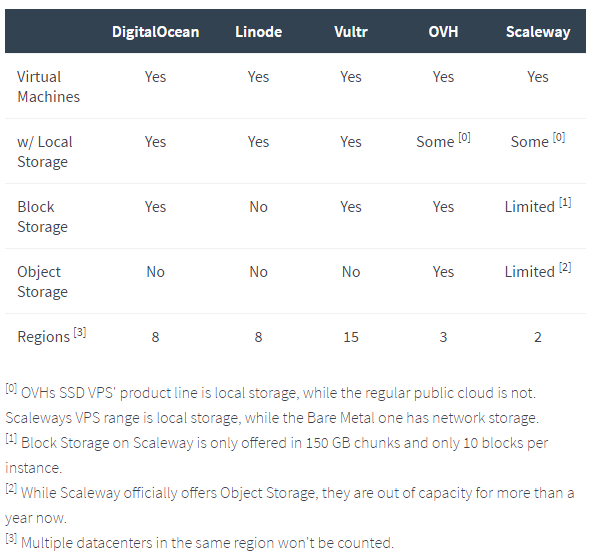EOS: What's Your BEST Bang-for-the-Buck Cloud Provider?
I just read @cryptofreedom's new post on setting up an EOS test server, something that I've been planning to do myself, if I can just take a gosh darn break from steemit long enough to get some other stuff done. Guess it's been an exciting few days around here! lol
He mentioned that he chose to deploy a $10/month DigitalOcean droplet, upon which I was about to comment. That's until I spent the next two hours updating my "cloud provider" knowledge for the ever-changing and evolving marketplace. After all that, it seemed more suitable that I turn it into a complete post of its own!

DigitalOcean was the first cloud provider I tried using when I needed to deploy some additional resources for my trading platform tymoraPRO, as well as for some other projects. My experience with them was great. The service was very reliable, and I would definitely recommend them, certainly if you need to diversify over multiple cloud providers.
However, then I came across vultr.com, which I've mostly been using ever since. With the ability to upload your own ISO (including even Windows instances), free online (live droplet) snapshots, locations all around the globe, and at a cost of nearly half DigitalOcean's droplets, I had to at least check it out. After several months of reliability testing (which included multiple tests of "customer support"), I made the switch.
For my usage cases, overall, vultr's reliability has been excellent, and when I have had support issues come up, I generally received excellent responses within minutes. To be fair, as I recall, DigitalOcean was also excellent in this regard as well. I also found that vultr's servers seemed faster as well, with my fastest droplets running at 3.6ghz, versus DigitalOcean's droplets that were running around 2.4ghz at the time (as I recall).
However, in comparison to @cryptofreedom's $10/month DO droplet, you're getting almost double the power. And then I came across scaleway.com, that seems to be trying to flip the cloud market on its head. More on that later...
| DigitalOcean.com | vultr.com | scaleway.com |
|---|---|---|
| $10/mo | $10/mo | ~$11.50/mo |
| 1gb Memory | 2gb Memory | 8gb Memory! |
| 1 CPU | 1 CPU | 6 x86 CPU |
| 30gb SSD | 40gb SSD | 200gb SSD |
| 2TB transfer | 2TB transfer | 200Mb/s unmetered |
(Note that while Linode used to be more expensive, and while I don't really have any experience with them, they seem to be trying to compete with vultr's pricing now as well.)
vultr.com and scaleway.com (which I believe is related to Iliad/online.net) even have plans down to the $2.50-$3.50 range that also provide a huge bang-for-the-buck. Now, as we all know, there's a lot more to consider than just the price alone. The key is the best quality you can get for the price, because at the end of the day, garbage is garbage whatever price you paid for it. However, this review I found does a great job of comparing many of the current leading low-cost virtual cloud providers, and it's definitely worth checking out:
Link: Which cloud hosting company to choose in 2017?
Niklas Karoly's (the author of the post) analysis also seems to confirm my experience with vultr as well:
CPU Performance
Vultr offers the best CPU performance out of all contenders, but OVHs plan is only $3,50 compared to Vultrs $10 and DigitalOceans $20 so it's a very good offer. If you think about it, you could get 5x OVHs plan for the price of 1x DigitalOceans plan.
Disk Performance
Vultr is the winner here as well. We don't know what's up with OVH, but even for $3,50 the performance is not really great. DigitalOcean, Linode and Scaleway are OK, but we shouldn't forget that DO is double the price now!
Network performance
We think it's very good to see that we can get such a great network performance out of such cheap servers. Think about how expensive it was to get a shared 10 GbE port 3 years ago, now we get them with a $5-10 machine! OVH probably offers the best network, but it's throttled at only 12 MB/s, compared to the competition that feels a bit underwhelming. Scaleways network is good, sadly inconsistent, but as with OVH you don't pay for any overusage. If you need to push a lot of public bandwidth, you should go with Vultr, otherwise OVH is a great fit. If you need predictable performance you should think about DigitalOcean or Linode.
CONCLUSION
So, for more important uses, I'll definitely be sticking with vultr.com for now. However, the bang-for-the-buck offered by Scaleways, along with its unmetered bandwidth, certainly has compelled me to give it a spin and see if there's a use case for it. Perhaps it can serve as an inexpensive test bed for messing around with a multi-node EOS testnet (once the P2P code is reimplemented). While scaleway's atom processors are definitely less powerful than DO's or vultr's, it's hard to beat with 2 CPUs / 2gb memory for around $3.25/mo or 8 CPUs / 8gb memory for around $13.50/mo! Also interesting with scaleways is that they are one of the first providers to offer ARMv8 servers as well, which are available as KVM virtual cloud servers (at the same price as X64), or as Bare Metal (dedicated) servers, also starting at around $3.25/month. On the negative side, I have read multiple reports that service and support may be "minimal" (to put it kindly) versus what you may come to expect from vultr or DO. But once again, each may have its niche given the right situation and use case.

(Cavium ThunderX is the first ARMv8 based SoC that scales up to 48 cores with up to 2.5 GHz core frequency)
IF you do decide to try vultr.com, you can see if using my "affiliate code" saves you anything: http://www.vultr.com/?ref=6808762
If not, feel free to try some of the discount codes (available only for new vultr users) at this link:
Link: 2017’s June- $52+$20 Vultr credit 365 Days Free Coupon Code
For example, gift code "DOMORE" may offer new vultr accounts a $50 FREE usage credit for the first 6 months of use. Or if you want to continue using vultr, try funding your account with gift code "VULTRMATCH", and they should double your credit up to $100.
For those of you who want to delve into this even further, I found several ycombinator threads worth checking out describing various experiences with these services:
Link: HackerNews Thread: Vultr introduces $2.50/month plan (vultr.com)
AND FINALLY...
I'd like to give an honorable mention to STEEMIT's own @privex and @someguy123, who provide hosting for at least a few of STEEMIT's witnesses. They also seem to offer a reliable and competitive cloud service, as described in the post shown below and by some of the comments therein. However, my understanding is that they currently only accept payment in crypto (STEEM, SBD, LTC, and BTC). They are a registered company in Belize due to its strong privacy laws, making it very easy to deal with crypto, unlike in the US. They currently have servers available in both the US and Germany.
I'd be interested to hear more people's experiences with them as well, especially from those familiar with other providers such as DO and vultr. For $10/month, they offer 2 cores versus 1, and 50gb HD versus 40gb SSD for vultr. Feel free to correct me, but from the CPUs they list, I would guess cores are probably around 2.5ghz or so.
Link: We are Privex Inc. ( WE ACCEPT STEEM ) - protecting your privacy in the Cloud

Source: Which cloud hosting company to choose in 2017?
Decentralization is something that shouldn't be forgotten.
To make the platform resilient, all block producers can't use the same service provider. In an ideal world, all top 20 should use completely different systems.
and of course geographically dispersed as well, especially for a blockchain!
and as STEEMIT also experienced a few months back right after switching to AMAZON's "premium" cloud earlier this year, even the "creme de la creme" of cloud services can get "dinged" as well.
From @mrosenquist's post earlier this year:
Link: The Real Lesson from the AWS Outage
And more on the failure itself:
Link: Amazon’s massive AWS outage was caused by human error... One incorrect command and the whole internet suffers.
While massive decentralization helps, it doesn't solve everything, and also brings on its own set of potential issues, which @Dan acknowledges up-front with EOS and plans to address by means of various clever and ingenious design features. That's why 99.99999% uptime and SLAs will always be an illusion. Murphy's Law works hard to make sure of it!
Link: EOS.IO Technical White Paper
Hi, thank you for the mention :)
Slight correction - our servers are actually available in both the US and Germany (we don't do servers in Belize, since Belize is actually a pretty awful place to have servers due to south america's poor connectivity).
We are however, a registered company in Belize, thanks to their strong privacy laws, and non-existant taxes (makes dealing with crypto very easy unlike the US).
thanks @privex for the update and correction, not sure how I came to misunderstand that aspect, but I was wondering at the time, hmmm, maybe Belize has come a long way since I last checked! I know fiber was being dropped all over the Caribbean, so I figured maybe Belize (even though it's a bit further out) was also trying to be a new "tech hub" out there or something! lol Regardless, I've updated the post to better reflect what you offer.
If its just for testing, Google and Microsoft each give free credits. I got $50 a month from Azure when I bought VS 2016 pro but I think they give a credit even without purchase. I got $150 from Google but runs out after a month or $150 whichever comes first. Amazon might have free credits too, or the others you mentioned.
I liked MS Azure a little better than Google. You can be up and running Ybantu 16.04 in just a few clicks. Thanks for the info on the other hosting options, I will check them out!
Nice post! Thanks. Please follow me: @martinst
Thanks for the in depth side-by-side comparison, @alexpmorris :)
hmmm, looks interesting.
Congratulations @alexpmorris! You have completed some achievement on Steemit and have been rewarded with new badge(s) :
Click on any badge to view your own Board of Honnor on SteemitBoard.
For more information about SteemitBoard, click here
If you no longer want to receive notifications, reply to this comment with the word
STOPBy upvoting this notification, you can help all Steemit users. Learn how here!